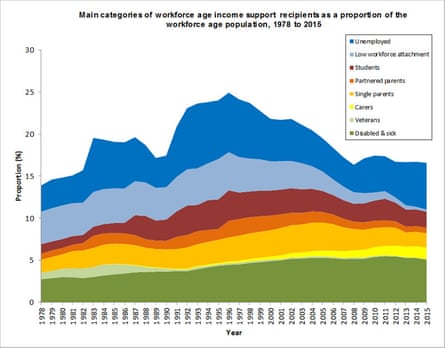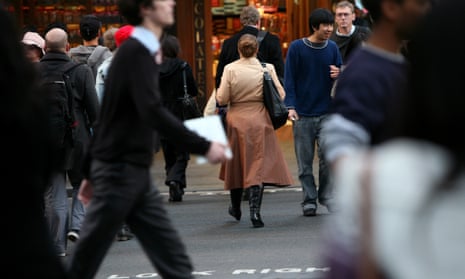The proportion of Australia’s working age population that receives income support is much lower than it was in the mid-1990s, according to new Parliamentary library research.
Researchers say relatively low unemployment rates in Australia, and successive tightening of eligibility requirements for some support payments, has seen the proportion of the working-age population claiming income support decline significantly to 16.6%, from a peak of over 25% in 1994.
Jenny Macklin, Labor’s spokeswoman for Family and Payments, said the finding suggests the treasurer, Scott Morrison, should “stop trying to divide Australians” by suggesting we live in a country of “taxed and taxed nots”, as he did during a major speech on the economy last week.

Morrison warned that reining in the growth in welfare spending was one of the “most difficult challenges” confronting the commonwealth budget.
He also said a generation of young Australians had grown up thinking that government payments were a “common and expected component of their income” over their entire life cycle, rather than the reserve of people in real need of a hand up.
“On current settings, more Australians today are likely to go through their entire lives without ever paying tax than for generations,” Morrison said.
“More Australians are also likely today to be net beneficiaries of the government than contributors – never paying more tax than they receive in government payments.
“There is a new divide – the taxed and the taxed nots.”
Parliamentary Library research shows that since 1994, despite a significant decline in the number of people claiming income support, there has been a large increase in payments to the sick, to people with a disability and to carers.
“The most dramatic increase in income support reliance for the working age population has been among carers,” Parliamentary Library researchers said.
“The proportion of the working age population receiving Carer Payment has doubled since 2005, from 0.7% to 1.4%. Ageing of the population overall, with a consequential increase in the need for carers, may be a factor in this increase.
“It is also possible that changes to the eligibility for the age pension and other payments for mature-aged women have meant that those who are caring for elderly partners are now accessing this payment.”
The researchers show that between 1998 and 2015, the proportion of Australians receiving parenting payments has declined from a high of 5% to 2.4%.
Macklin says the Coalition could more easily reduce the deficit if it considered some of Labor’s policy proposals, such as its negative gearing changes, rather trying to take more money from low-income households.
“It’s clear that the Liberals haven’t learned the lessons from their calamitous first-term in office,” Macklin said.
New data from the Bureau of Statistics, released on Monday, showed there were 970,800 single-parent families in Australia in June 2015, making up 15% of all families – a rise of 58,600 since 2012.
Parliamentary Library research suggests the reason the number of people receiving parenting payments has declined is because of tighter eligibility requirements.
Pauline Hanson told Sky News on Monday that welfare had become a way of life in Australia.
“A lot of people are saying look, why should I get up and, go, you know, get up early and go to work, and actually, the neighbour next door can be sitting home with three or four kids and actually getting more welfare than what he’s getting paid to go to work and provide for his family,” Hanson said.
“Welfare is there as a helping hand, as I said, not a way of life. We’ve got to concentrate on looking after the pensioners, the sick, and the disabled, and our young ones who are not in a position to look after themselves.”

Comments (…)
Sign in or create your Guardian account to join the discussion